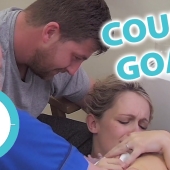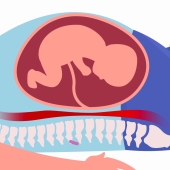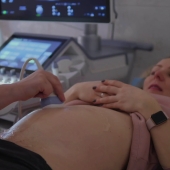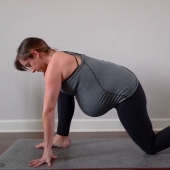You already know that good nutrition is a must during pregnancy, but do you need a prenatal vitamin? Which one? How do you choose? When should you start? Kate tells you more!
You already know that good nutrition is a must during pregnancy. That’s why your shopping cart looks like a rainbow, and you’re planning meals with all the food groups. But let’s be honest: it’s hard to know if you’re really getting all the vitamins and minerals you and your child need.
That’s where prenatal vitamins come in. They don’t replace a balanced diet, but instead act like backup – making sure you don’t fall short on the essential nutrients you need during pregnancy.
Prenatal vitamins also deliver the extra amounts of nutrients needed during various stages of your little one’s development. For example, vitamin D and calcium are especially needed to build strong bones and teeth during the third trimester.
Ideally, you should start taking prenatal vitamins at least a month before conception and throughout your entire pregnancy. In fact, it’s often best to take a prenatal vitamin every day if there’s a chance you could get pregnant at all, even if you’re not planning for it. That’s because crucial neurological development takes place during the first month of pregnancy, when folic acid would offer the most protective benefits.
Prenatal vitamins are readily available over the counter and a prescription is generally unnecessary. (Note: Check with your insurance to see if they cover prenatal vitamins. If so, you’ll likely need your doctor to give you a prescription for them.)
Every vitamin can differ in the types and amounts of nutrients it contains because specific vitamin ingredients aren’t regulated by the FDA. If the vitamin you choose doesn’t contain the full recommended daily amount of a nutrient, be sure to eat foods that are high in that vitamin or mineral.
When shopping for prenatal vitamins look for these four primary nutrients that are especially important during pregnancy (amounts are per day and recommended by the American Congress of Obstetricians and Gynecologists):
Folic acid - 600 mcg
Iron - 27 mg
Calcium - 1,000 mg
Vitamin D - 600 IU
The following vitamins are also essential during pregnancy, and you may not get enough of them through diet alone. Having these in your prenatals are helpful too:
Vitamin A - 770 mcg (Note: The safest form of Vitamin A is beta-carotene or other carotenoids.)
Vitamin C - 85 mg
Vitamin B6 - 1.9 mg
Vitamin B12 - 2.6 mcg
Consider it a bonus if you find a prenatal vitamin that also contains omega-3 fatty acids. There’s strong evidence indicating that omega-3 fatty acids (particularly DHA)–a fat found in some types of fish–may play an important role in the development of your baby’s brain and nervous system. The March of Dimes recommends you get 200 mg of DHA a day through diet or supplementation.
Vitamins come in multiple forms: pill, soft gel capsule and gummies. For some moms-to-be, swallowing and holding down a pill can be difficult especially when queasy. If that’s your situation, try a soft gel capsule or a gummy vitamin. Note: Gummy vitamins do not contain iron, so you’ll need an extra iron supplement for that.
When thinking about which prenatal vitamin to buy, consider what you typically eat and where your diet may fall short. If you’re a vegetarian, iron supplementation might be crucial. If you don’t eat dairy, calcium might be a must-have. Hate fish? Then look for a vitamin that contains DHA.
If you still feel unsure about which prenatal vitamin is best for you, ask your doctor for a recommendation. Once you start a supplement that can help you keep up with the increased demands pregnancy makes on your body, you’ll rest easier.
- 3094 views













